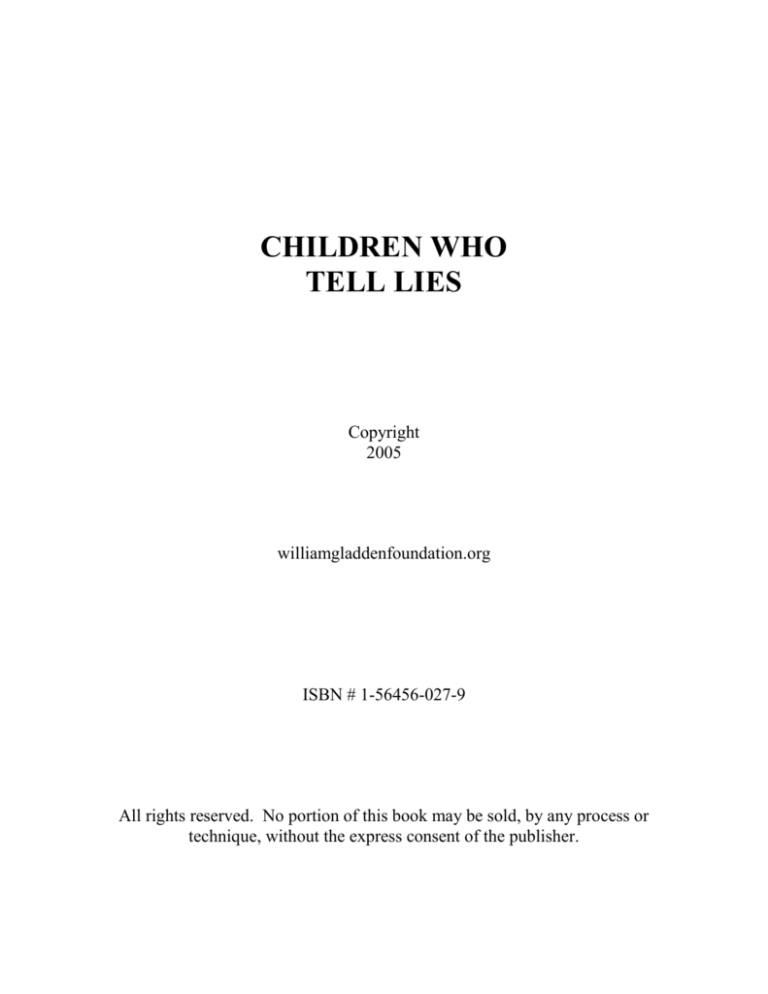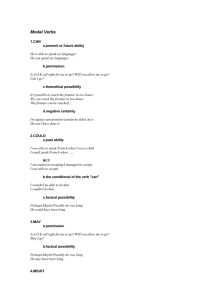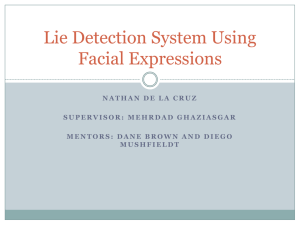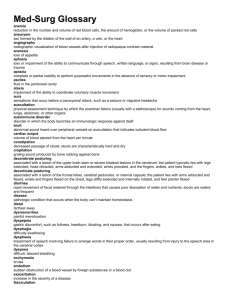
CHILDREN WHO
TELL LIES
Copyright
2005
williamgladdenfoundation.org
ISBN # 1-56456-027-9
All rights reserved. No portion of this book may be sold, by any process or
technique, without the express consent of the publisher.
INTRODUCTION
Paula is not quite four-years-old. She insists that “Penny,” her imaginary girlfriend, talks
to her every night. Paula’s parents are alarmed because their daughter truly seems to
believe in what she is saying.
Johnny is eight years of age. His mother reports that she often overhears him tell his
friends lies about where his father works and things his father promised to do with him
and for him. Johnny’s parents were never married and he has never met his father.
Freddy is age 13. He recently was caught stealing and has a history of fighting at school.
According to his mother, Johnny lies constantly. Not only does he lie to avoid
punishment, his mother thinks he lies for no apparent reason. Freddy’s mother is very
concerned about this behavior but his father thinks it is “just a phase” that all boys go
through. The parents disagree about disciplining Freddy.
All three of these children have lied, each for his or her own reason. Paula’s lie may be
the result of a vivid imagination that is too immature to distinguish between fact and
fiction. Johnny’s lie is a fantasy that he wishes were true. Freddy is a “delinquent liar”
and is probably fully aware of what he is doing. All three of these children may benefit
from psychological intervention, especially Freddy and Johnny, before their lying
behavior grows worse or they develop other inappropriate behaviors.
Parents and teachers want their children and students to be honest. In fact, both parents
and teachers rank honesty as the most desirable characteristic they wish to see in their
children and students. Furthermore, childhood lying is the characteristic least liked by
parents and teachers.
Most children “bend the truth” at some point in their development. For example, many
parents have heard their very young child describe a make-believe friend or caught a
child fibbing to avoid punishment. However, when these behaviors extend into middle
childhood, or occur frequently, parents should be concerned. Frequent lying in children
is likely to create hostility, mistrust and feelings of betrayal in parents, causing potential
problems in the parent/child relationship. Parents also often fear that this behavior may
be symptomatic or a more serious problem. This publication explores the many aspects
of lying in childhood.
Warren A. Rhodes, Ph.D.
William Gladden Foundation
-II-
TABLE OF CONTENTS
QUESTIONS AND ANSWERS
What Is Lying?.....................................................................................................................4
Why Do Children Tell Lies?................................................................................................4
Do All Children Go Through A Phase During Which They Lie?.......................................4
What Is Fantasy Lying?.......................................................................................................4
What Is Delinquent Lying?..................................................................................................5
Does Lying Lead To Other Inappropriate Behaviors?.........................................................5
Is Lying A Serious Problem?...............................................................................................5
How Is It Possible To Tell If A Child’s Lying Is Cause For Concern?...............................5
Is Childhood Lying Related To A Specific Psychological Disorder?.................................6
What Is A Conduct Disorder?..............................................................................................6
Is Lying Behavior Alone A Psychological Disorder?..........................................................6
At What Age Should Parents Disregard Lying?..................................................................6
Does Lying Increase With Age?..........................................................................................7
Why Do Parents Dislike Lying By Their Children?............................................................7
Can Family Relationships Damaged By Lying Be Repaired?.............................................7
What Type Of Home Environment Is Likely To Promote Childhood Lying?....................7
How Do Parents Contribute To Their Child’s Lying?.........................................................8
Should Parents Lie To Protect Their Children From Suffering?.........................................8
What Should Parents Do When Their Children Discover
They Have Not Told The Truth?....................................................................................8
What Should Parents Do When They Catch Their Children Lying?...................................8
What Should Parents Do When A Child Has Truthfully Admitted
Doing Something Wrong?..............................................................................................8
HOW LYING CAN ADVERSELY AFFECT THE
PARENT/CHILD RELATIONSHIP…………………………………………..……9
COMMON REASONS CHILDREN TELL LIES……………………………..……..11
FAMILY PROBLEMS THAT CAN PROMOTE
CHILDHOOD LYING BEHAVIOR………………….……………….…………..12
SYMPTOMS ASSOCIATED WITH LYING BEHAVIOR
INDICATIVE OF A POSSIBLE CONDUCT DISORDER……..….....................13
HOW PARENTS CAN PREVENT THEIR CHILDREN FROM LYING
OR HELP THEM OVERCOME THIS NEGATIVE BEHAVIOR…………...…14
AGENCIES AND PROFESSIONALS TO CONTACT
ABOUT CHILDHOOD LYING…………………………………………………....15
-IV-
WHAT IS LYING?
Lying usually refers to any misrepresentation of the truth. However, the INTENT to
falsify the truth plays an important role in determining whether a lie is a purposelynegative act. For example, children sometimes unintentionally distort the truth, misstate
the truth unconsciously (due to limited abilities or developmental level) or are unable to
distinguish truth from falsehood correctly. For our purposes, lying is “any conscious
misrepresentation of the truth not resulting from limited abilities or developmental level.”
WHY DO CHILDREN TELL LIES?
Mental health professionals disagree on the cause(s) of lying in childhood. Some believe
lying is unconscious, that children – especially very young children – are not fully aware
that they are lying. Others believe lying is a symptom of a poor parent/child relationship.
Mental health professionals generally do agree, however, that frequent lying is a cause
for serious concern and that the psychological, social and moral development of the child
may be at risk.
DO ALL CHILDREN GO THROUGH A PHASE DURING WHICH THEY LIE?
NO, parents should be concerned when a child consciously and frequently misrepresents
the truth. The lying behavior may be a “cry for help,” an inappropriate reaction to family
or social problems or, when accompanied by other symptoms, a sign of psychological
disturbance. Lying is NOT a phase that all children go through.
WHAT IS FANTASY LYING?
As young children mature, they tend to discontinue earlier forms of misrepresentation
and may exhibit a type of fibbing often referred to as “fantasy lying.” That is, they may
tell stories about things they “wish” were true. For example, a child whose father is
absent because of separation or divorce may tell friends that his father promised to take
him to every ball game of the season, even though such a promise was never made. A
child who exhibits this behavior is sometimes referred to as a “fantasy liar.” The help of
a mental health professional may be needed to determine if the child’s lying behavior
warrants further intervention.
-4-
WHAT IS DELINQUENT LYING?
Later in their development, children may tell lies as a means to get what they want, to
gain the favor of others, to stimulate conflict or for no apparent reason. This type of
falsification is called “delinquent lying.” Parents can usually overlook the earlier forms
of misrepresentation, but should be concerned when delinquent lying occurs frequently or
accompanies other forms of misconduct. Intervention by a mental health professional is
often advised in such cases.
DOES LYING LEAD TO OTHER INAPPROPRIATE BEHAVIORS?
Research has not determined whether lying leads to or results from other inappropriate
behaviors. Research does show, however, that children who lie frequently tend to engage
in various types of misconduct such as stealing, fighting and other delinquent behaviors.
They are also likely to have deviant friends.
IS LYING A SERIOUS PROBLEM?
YES, most people view lying as a VERY serious problem. Research indicates that
mental health professionals, educators and parents rate lying as one of the most serious
childhood behavioral problems. Studies of school students show that children also regard
lying as an undesirable behavior.
HOW IS IT POSSIBLE TO TELL IF A CHILD’S LYING IS CAUSE FOR
CONCERN?
When trying to determine if a child’s lying is cause for concern, it is important to
consider the child’s age, reason for and frequency of lying and whether other
inappropriate behaviors accompany the lying. Most mental health professionals are
trained to identify whether or not specific incidents of lying are symptoms of a
psychopathology (a mental or behavioral disorder).
-5-
IS CHILDHOOD LYING RELATED TO A SPECIFIC PSYCHOLOGICAL
DISORDER?
YES, the Diagnostic and Statistical Manual, a reference used by most mental health
professionals in diagnosing and classifying psychological disorders, lists lying among the
behaviors considered “psychological disorders,” lists lying among the behaviors
considered symptomatic of conduct disorder. Conduct disorder is the only childhood
diagnostic disorder in the DSM for which the symptom lying is included, but there is a
host of other, more serious symptoms that a child must exhibit before diagnosed as
having a conduct disorder.
WHAT IS A CONDUCT DISORDER?
A conduct disorder is a serious behavioral disorder that may begin in childhood and
extend into late adolescence. Youths with this disorder demonstrate a persistent pattern
of misconduct. They disregard age-appropriate social behaviors and violate the rights of
others. Cruelty to people or animals, fire setting, theft, sexual misconduct and physical
violence are examples of some misconduct that characterized a conduct disorder.
IS LYING BEHAVIOR ALONE A PSYCHOLOGICAL DISORDER?
NO, lying behavior alone is not a psychological disorder. However, lying as a problem
behavior in children rarely occurs by itself. Mental health professionals agree that lying
– when accompanied by other inappropriate behaviors – many constitute cause for
psychological intervention.
AT WHAT AGE SHOULD PARENTS DISREGARD LYING?
Very young children (age 4 or younger) tend not to tell the truth quite innocently. They
may truly believe that they are playing with “Big Bird.” This type of misrepresentation
usually occurs because very young children are not yet able to distinguish what they think
from what has actually happened, and should not be cause for concern.
-6-
DOES LYING INCREASE WITH AGE?
NO, neither frequent nor occasional lying in children increases with age. In fact,
occasional lying decreases as children grow older and more mature. Frequent lying, if
left untreated, tends to remain stable over time.
WHY DO PARENTS DISLIKE LYING BY THEIR CHILDREN?
Lying stimulates distrust, suspicion and accusations of wrongdoing, which, in turn,
damages the parent/child relationship. Parents also realize that other undesirable
behaviors such as stealing, fighting and poor school performance lying often accompany
lying.
CAN FAMILY RELATIONSHIPS DAMAGED BY LYING BE REPAIRED?
YES, lack of trust caused by a lying child can be repaired. However, professional
intervention is sometimes required. Individual counseling can help to identify the
reasons why a child is lying. It can also lead to treatment strategies designed to help the
child overcome this negative behavior and develop a healthier personality. In some
cases, parents may learn that the cause of the lying behavior is a problem in the family
such as separation, divorce or unrealistic parental expectations. In such cases, family
counseling may prove helpful.
WHAT TYPE OF HOME EVNIRONMENT IS LIKELY TO PROMOTE
CHILDHOOD LYING?
Research suggests there is a close link between lying and the attitudes and behaviors of
the child’s parent(s). Children who frequently lie tend to live in homes where there is
parental discord, rejection, inconsistent discipline or poor supervision of the children.
However, it is not clear whether lying is the cause or the result of poor parental attitudes
and behaviors. For example, a parent may begin to reject a child who frequently lies
because the child’s lying violates parental values. On the other hand, a child may begin
to lie because he or she senses parental rejection and feels there is nothing to lose by
violating parental wishes.
-7-
HOW DO PARENTS CONTRIBUTE TO THEIR CHILD’S LYING?
Most parents have lied to their children. For example, all parents have at least “bent the
truth” when they felt it may protect their children from suffering. Some mental health
professionals believe that when parents lie to their children they set a bad example that
their children may copy. It is important that parents consider this possibility and be good
roles models whose actions exhibit correct ways to handle truth.
SHOULD PARENTS LIE TO PROTECT THEIR CHILDREN FROM
SUFFERING?
There are very few reasons why parents should lie to their children, even to protect them
from suffering. However, parents should always consider the child’s age and level of
understanding. Instead of misrepresenting the truth, parents should provide painful
information with loving reassurance and support. Imparting painful information by
displaying true concern and empathy is preferable to lying. There is truth to the adage,
“Honestly is the best policy.”
WHAT SHOULD PARENTS DO WHEN THEIR CHILDREN DISCOVER THEY
HAVE NOT TOLD THE TRUTH?
Parents should be honest about having lied and acknowledge that what they did was
wrong. They should explain the purpose for their dishonesty, but should not attempt to
justify the reason.
WHAT SHOULD PARENTS DO WHEN THEY CATCH THEIR CHILDREN
LYING?
Children must learn the consequences of lying. Punishment is just one of the
consequences. Children also must learn that lying can cause parents to feel hurt and
betrayed. Frequent lying can make parents suspicious and mistrustful, ultimately creating
poor interpersonal relationships between parent and child. Parents should carefully
explain how lying makes them feel, how it can harm their relationship and how it can
affect relationships with others.
WHAT SHOULD PARENTS DO WHEN A CHILD HAS TRUTHFULLY
ADMITTED DOING SOMETHING WRONG?
Parents should thank the child for his/her honesty. They should emphasize the
importance of being truthful and the consequences of lying, especially as it relates to
development of suspicion, mistrust and poor interpersonal relationships. However,
parents should not let the child’s truthfulness interfere with reasonable consequences for
misconduct. It is always important to handle inappropriate behaviors consistently and
clearly.
-8-
HOW LYING CAN ADVERELY AFFECT THE
PARENT/CHILD RELATIONSHIP
A child’s lying can create a downward cycle in the parent/child relationship. Once in
motion, the downward cycle is difficult to break without the guidance of a mental health
professional. The following diagram and explanation describe this downward cycle and
its effects on the parent/child relationship.
(PLACE DIAGRAM HERE)
CHILD LIES
Once a child tells a lie, and depending on his/her moral development, some degree of
guilt usually is exhibited. Parents may become suspicious when they sense the child is
feeling guilty. However, if the child continues to lie, with or without detection, he/she
will probably stop feeling and acting guilty. Parental suspicion may then lead to a
parent/child confrontation, the severity of which largely depends on factors such as the
level of parental suspicion, the nature of the lie and the prior parent/child relationship.
The severity of sanctions for lying, and the prior parent/child relations, are probably the
most important factors determining if the child denies having lied.
-9-
PARENTS DISCOVER
When parents discover that their child has lied, they often experience negative feelings
such as betrayal, hostility, anger and resentment. The severity of the parental reaction is
greatly influenced by the circumstances of the discovery (Did the child admit to the lie
when first confronted, or did the child maintain the lie until confronted with irrefutable
evidence?). The severity of punishment is likewise dependent on factors such as the
impact of the lie on others, the degree of parental frustration or embarrassment and the
frequency of lying.
PARENTS BECOME OVERLY SUSPCIOUS
Once the child has shown a capacity for serious lying, the parents may become
increasingly dubious about the child’s integrity. As a result, they may come to question
nearly everything the child says or does. The child will probably resent this intense
parental scrutiny and react by displaying other provocative behaviors, thereby stimulating
more conflict with the parents.
CHILD SENSES PARENTAL MISTRUST
Sensing that his/her parents are distrustful may cause the child to feel alienated and
rejected. In turn, these feelings may result in more rebellious, less inhibited, retaliatory
behaviors.
PARENTS FEEL FRUSTRATED AND HELPFLESS
The child’s parents become consumed with frustration, feelings of helplessness and
desperation. They may react increasingly more severely to every provocation, further
alienating the child. Parent/child conflict escalates. The child continues to lie and is
likely to develop other undesirable behaviors. Professional intervention is usually
required to improve a parent/child relationship caught in such a vicious downward cycle.
-10-
COMMON REASONS CHILDREN TELL LIES
There are many reasons children tell lies. When trying to determine if a child’s lying
behavior is cause for concern, it is important to consider factors such as the child’s age,
the frequency of lying, the presence of other inappropriate behaviors and the reason(s) for
lying. The following are some of the more common reasons children tell lies.
As a cry for help
To avoid punishment
To create a new reality when the old reality is unpleasant
To create conflict
To maintain family secrets
To avoid embarrassment
To obtain social approval from peers
To gain attention
To reduce fear or anxiety
To protect others
To obtain a desired object or goal
To gain an advantage
To get support
To reduce tension
To manipulate people or situations
To get revenge
To avoid responsibility
To appear helpless
To intentionally offend others
-11-
FAMILY PROBLEMS THAT CAN PROMOTE
CHILDHOOD LYING BEHAVIOR
Numerous family circumstances may interfere with the growth of appropriate moral
values and increase the likelihood of the child developing a pattern of lying. The
following are some of the more common family problems that can promote childhood
lying behavior.
Acute or terminal illness of a family member
Alcohol use or abuse of family member(s)
Delinquency or criminal activities of family member(s)
Death of a family member
Domestic violence
Drug use or abuse by family member(s)
Emotional abuse or neglect
Family financial problems
Harsh or severe discipline
Immoral behavior of family member(s)
Inconsistent discipline
Lack of discipline
Lack of supervision
Lying by family member(s)
Parental disagreement about discipline
Parental disagreement about values
Parental divorce
Parental separation
Physical abuse or neglect
Psychological or emotional problems of family member(s)
Sexual abuse
Sexual promiscuity of parent(s)
Unrealistic parental expectations
-12-
SYMPTOMS ASSOCIATED WITH LYING BEHAVIOR INDICATIVE OF
A POSSIBLE CONDUCT DISORDER
Lying as a problem behavior in children rarely occurs by itself. Mental health
professionals agree that lying – when accompanied by other inappropriate behaviors –
may constitute cause for psychological intervention. Only a trained mental health
professional can diagnose a conduct disorder. In determining a diagnosis, they look for
symptoms such as the following.
Alcohol abuse
Breaking into someone else’s property
Chronic cheating
Cruelty to people or animals
Deliberately destroying another person’s property
Drug abuse
Fire setting
Initiating physical fights
Theft
Running away from home
School problems
Sexual misconduct
Truancy
Using a weapon fights
-13-
HOW PARENTS CAN PREVENT THEIR CHILDREN FROM LYING OR
HELP THEM OVERCOME THIS NEGATIVE BEHAVIOR
Moral development begins at home. Values that discourage lying must be carefully
defined and maintain by all family members. When lying occurs, apply appropriate
discipline consistently and in a caring manner. The following are some hints to help
parents maintain a positively reinforcing relationship with their children and decrease the
likelihood that they will tell lies.
Admit when you have not been honest
Allow your children to openly express their fears and anxieties
Avoid giving messages that may encourage lying
Avoid the use of severe punishment
Be consistent with discipline, particularly with regard to lying
Develop and maintain an open communication system with your children
Develop, maintain and communicate reasonable expectations of your children
Explain to your children how lying affects trust
Make clear your personal moral code about lying
Provide your children with adequate supervision
Reinforce the importance of being truthful, particularly in the face of adverse
consequences
Seek professional help, if necessary
Try to understand the reason(s) your child lied to you and how you may have
contributed to causing the lie
Understand that some forms of laying are caused by family problems
Understand that some forms of lying are developmentally appropriate
-14-
AGENCIES AND PROFESSIONALS TO CONTACT
ABOUT CHILDHOOD LYING
Lying behavior can be a complicated psychological issue that may require specialized
help. The following is a list of agencies and professionals to contact about childhood
lying. Refer to the telephone book for names and numbers.
MENTAL HEALTH CENTER – Most communities have a counseling center where
trained professionals are available to help people that have emotional or behavioral
problems. A staff psychiatrist, psychologist or counselor can administer and interpret
psychological testing and provide counseling.
Telephone #
CHILDREN AND YOUTH SERVICE – Most communities have a local agency that
specializes in matters related to children. These professionals are trained to deliver
services to children having social, emotional or behavioral problems. They also can
make a referral to other agencies and professionals.
Telephone #
PSYCHIATRIST OR PSYCHOLOGIST IN PRIVATE PRACTICE – Psychiatrists
and psychologists can administer and interpret psychological rests to determine the
causes of a child’s lying behavior. They also can provide counseling services designed to
help the child resolve the problems that create a need to tell lies.
Telephone #
FAMILY THERAPIST OR COUNSELOR – Family problems can cause or contribute
to lying behavior. The child’s lying behavior also can cause family stress. Family
members experiencing stress that may cause or result from a child’s lying may benefit
from therapy or counseling.
Telephone #
JUVENILE PROBATION DEPARTMENT – Children whose lying behavior is part of
a larger conduct disorder may benefit from juvenile court intervention. Most counties
have at least one judge and one probation officer responsible for juvenile and family
court matters. Their job is to know the legal and behavioral aspects of juvenile
delinquency, as well as the community services available to children experiencing
behavioral problems.
Telephone #
-15-









